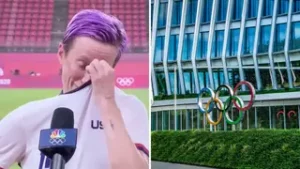
In a surprising turn of events, the International Olympic Committee (IOC) has made a bold decision to ban Megan Rapinoe, the outspoken soccer star, from participating in any future Olympic Games. This comes as a shock to many, as Rapinoe has been a prominent figure in the sports world, known for her activism and strong opinions. The move raises questions about the line between an athlete’s right to free speech and the responsibility that comes with representing their country on an international stage.Rapinoe, who gained fame for her exceptional skills on the field and her fervent advocacy for social justice off it, has been a polarizing figure in recent years. Her decision to kneel during the national anthem as a protest against racial injustice and her public criticisms of former President Donald Trump have earned her both praise and criticism.
However, her actions seem to have caught up with her. The IOC’s decision to ban her from the Olympics cites a violation of the organization’s principles, particularly those regarding sportsmanship and respect for the host country. The final straw appears to have been Rapinoe’s recent actions during a World Cup qualifying match in which she refused to stand for the national anthem of the opposing team’s country.IOC President Thomas Bach stated, “While we understand the importance of athletes using their platforms to raise awareness about social issues, it’s essential to balance that with the respect and sportsmanship that the Olympic Games represent. Ms. Rapinoe’s actions have repeatedly crossed that line, and we cannot condone behavior that disrespects not only the host nation but the spirit of unity that the Olympics embody.”
The decision has sparked a heated debate within the sports community and beyond. Supporters argue that athletes should be allowed to express their opinions and use their platform to advocate for change, even if it means challenging the norms of sportsmanship. On the other hand, critics believe that athletes should prioritize representing their country and showing respect to other nations, especially during international competitions.
Rapinoe’s response to the ban has been characteristically unapologetic. In a tweet, she wrote, “I will continue to stand up for what I believe in, even if it means facing consequences. The IOC’s decision only strengthens my resolve to fight for justice and equality.”



